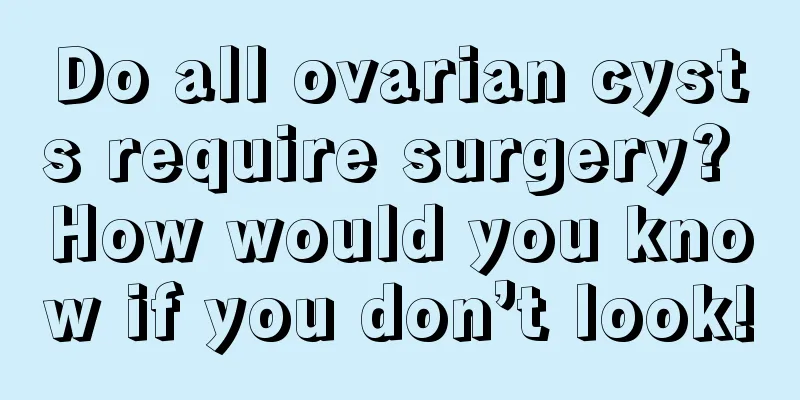Do all ovarian cysts require surgery? How would you know if you don’t look!

|
Ovarian cyst is a common gynecological disease in women. It is an important reproductive organ in women and can affect ovarian function and hormone secretion. Therefore, once it is confirmed that it is an ovarian cyst, it is best to undergo surgery immediately. However, there are many types of ovarian cysts. Do they all require treatment? 1. Functional cyst This is the most common cyst. It occurs in women of childbearing age during the ovulation cycle, when an abnormal amount of fluid accumulates in the follicles or corpus luteum, forming follicular cysts or corpus luteum cysts. This functional cyst can sometimes be quite large, but it usually disappears on its own within three months, regardless of medication or not. 2. Hemorrhagic cyst Sometimes follicular cysts and corpus luteum cysts grow too rapidly, causing ovarian tissue to be pulled and bleeding. If the ovarian corpus luteum ruptures, it will cause a lot of bleeding in the abdominal cavity, which can easily cause shock and require surgical treatment. If the amount of bleeding is not much, the body can absorb it on its own. 3. Chocolate Cyst It is a type of endometriosis, which causes a large amount of sticky brown, chocolate-like fluid to form in the ovaries. With or without abdominal pain during menstruation, because endometriosis will grow larger over time, gradually eroding normal tissues and causing irreversible damage to ovarian tissues. In severe cases, it can affect conception. If drug treatment is ineffective, surgical treatment is required. 4. Teratoma This is a very special cyst. It may be caused by a problem in cell differentiation during the embryonic period. It takes a long time to manifest itself and can occur at any age. It will produce hair, teeth, etc. in the ovaries, so it is best to remove it early. Ovarian cysts are small and mostly asymptomatic. When the cysts grow larger, clinical manifestations include lower abdominal distension, discomfort, abnormal vaginal discharge, or menstrual disorders. When cysts affect hormone secretion, symptoms such as irregular vaginal bleeding may occur. Larger cysts can put pressure on the area near the bladder, causing symptoms such as frequent urination, constipation, shortness of breath, and palpitations. |
<<: Female urethra itching? Or these reasons
>>: Do you know how to massage your shoulders and neck for fatigue?
Recommend
Is fetal reduction surgery painful?
Sometimes life is very unfair. Some women try eve...
What disease is it if the cervix feels like it has small particles?
As the name suggests, the cervix is a part of t...
Should I tie my hair up or let it down when I sleep?
Women have a dilemma when they go to sleep: wheth...
What is the reason for a pregnant woman's crooked belly?
Pregnant women's bellies will become particul...
What are the surgical procedures for induced labor at 4 months?
After a female friend becomes pregnant, it may be...
The correct way to clean vulvar itching during pregnancy
Pregnant women often have excessive secretions fr...
What to eat to help soften the cervix and how to do it
The problem of hardened cervix is a very distre...
Acne on nose during pregnancy
Pregnant women should not panic regarding various...
Is it a boy or a girl if she likes to eat sour food during pregnancy?
When a mother is pregnant, her body will undergo ...
Causes of brown menstrual period
If irregular menstruation occurs, you will feel b...
How to check whether the fallopian tubes are obstructed?
The main cause of infertility is fallopian tube o...
Symptoms of cervical polyps during pregnancy
When pregnant women find that they have cervical ...
Medicines that promote blood circulation, remove blood stasis, and shrink the uterus
Women are likely to experience dysmenorrhea durin...
Wild vegetables are beautiful, but you need to be careful
Spring is here, and it is time to eat fresh wild ...
Is it better for the follicle to be on the left or the right?
Nowadays, many women need to undergo a systematic...









